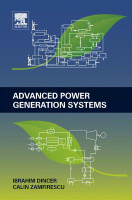Browse content
Table of contents
Actions for selected chapters
- Full text access
- Book chapterAbstract only
Chapter 1 - Fundamentals of Thermodynamics
Pages 1-53 - Book chapterAbstract only
Chapter 2 - Energy, Environment, and Sustainable Development
Pages 55-93 - Book chapterAbstract only
Chapter 3 - Fossil Fuels and Alternatives
Pages 95-141 - Book chapterAbstract only
Chapter 4 - Hydrogen and Fuel Cell Systems
Pages 143-198 - Book chapterAbstract only
Chapter 5 - Conventional Power Generating Systems
Pages 199-310 - Book chapterAbstract only
Chapter 6 - Nuclear Power Generation
Pages 311-368 - Book chapterAbstract only
Chapter 7 - Renewable-Energy-Based Power Generating Systems
Pages 369-453 - Book chapterAbstract only
Chapter 8 - Integrated Power Generating Systems
Pages 455-516 - Book chapterAbstract only
Chapter 9 - Multigeneration Systems
Pages 517-573 - Book chapterAbstract only
Chapter 10 - Novel Power Generating Systems
Pages 575-596 - Book chapterNo access
Appendix A - Conversion Factors
Page 597 - Book chapterNo access
Appendix B - Thermophysical Properties
Pages 599-615 - Book chapterNo access
Index
Pages 617-644
About the book
Description
Advanced Power Generation Systems examines the full range of advanced multiple output thermodynamic cycles that can enable more sustainable and efficient power production from traditional methods, as well as driving the significant gains available from renewable sources. These advanced cycles can harness the by-products of one power generation effort, such as electricity production, to simultaneously create additional energy outputs, such as heat or refrigeration. Gas turbine-based, and industrial waste heat recovery-based combined, cogeneration, and trigeneration cycles are considered in depth, along with Syngas combustion engines, hybrid SOFC/gas turbine engines, and other thermodynamically efficient and environmentally conscious generation technologies. The uses of solar power, biomass, hydrogen, and fuel cells in advanced power generation are considered, within both hybrid and dedicated systems.
The detailed energy and exergy analysis of each type of system provided by globally recognized author Dr. Ibrahim Dincer will inform effective and efficient design choices, while emphasizing the pivotal role of new methodologies and models for performance assessment of existing systems. This unique resource gathers information from thermodynamics, fluid mechanics, heat transfer, and energy system design to provide a single-source guide to solving practical power engineering problems.
Advanced Power Generation Systems examines the full range of advanced multiple output thermodynamic cycles that can enable more sustainable and efficient power production from traditional methods, as well as driving the significant gains available from renewable sources. These advanced cycles can harness the by-products of one power generation effort, such as electricity production, to simultaneously create additional energy outputs, such as heat or refrigeration. Gas turbine-based, and industrial waste heat recovery-based combined, cogeneration, and trigeneration cycles are considered in depth, along with Syngas combustion engines, hybrid SOFC/gas turbine engines, and other thermodynamically efficient and environmentally conscious generation technologies. The uses of solar power, biomass, hydrogen, and fuel cells in advanced power generation are considered, within both hybrid and dedicated systems.
The detailed energy and exergy analysis of each type of system provided by globally recognized author Dr. Ibrahim Dincer will inform effective and efficient design choices, while emphasizing the pivotal role of new methodologies and models for performance assessment of existing systems. This unique resource gathers information from thermodynamics, fluid mechanics, heat transfer, and energy system design to provide a single-source guide to solving practical power engineering problems.
Key Features
- The only complete source of info on the whole array of multiple output thermodynamic cycles, covering all the design options for environmentally-conscious combined production of electric power, heat, and refrigeration
- Offers crucial instruction on realizing more efficiency in traditional power generation systems, and on implementing renewable technologies, including solar, hydrogen, fuel cells, and biomass
- Each cycle description clarified through schematic diagrams, and linked to sustainable development scenarios through detailed energy, exergy, and efficiency analyses
- Case studies and examples demonstrate how novel systems and performance assessment methods function in practice
- The only complete source of info on the whole array of multiple output thermodynamic cycles, covering all the design options for environmentally-conscious combined production of electric power, heat, and refrigeration
- Offers crucial instruction on realizing more efficiency in traditional power generation systems, and on implementing renewable technologies, including solar, hydrogen, fuel cells, and biomass
- Each cycle description clarified through schematic diagrams, and linked to sustainable development scenarios through detailed energy, exergy, and efficiency analyses
- Case studies and examples demonstrate how novel systems and performance assessment methods function in practice
Details
ISBN
978-0-12-383860-5
Language
English
Published
2014
Copyright
Copyright © 2014 Elsevier Inc. All rights reserved.
Imprint
Elsevier
